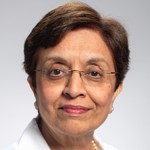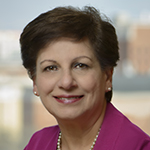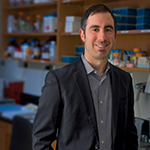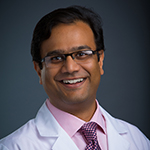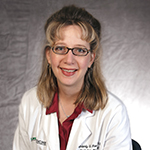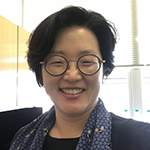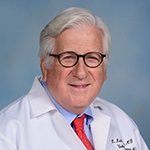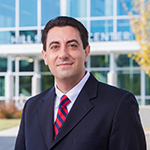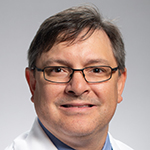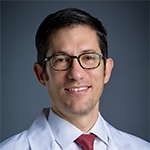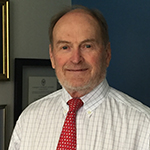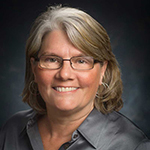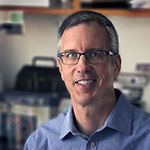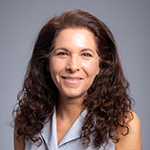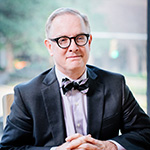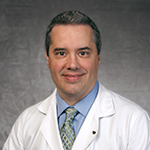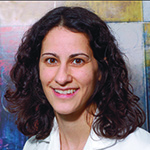Written by Mary Ashley Canevaro
An appointment to an endowed chair or professorship is among the highest academic honors a faculty member can receive. The School of Medicine holds a remarkable 193 endowed chairs and 103 endowed professorship positions. These honors contribute to recruitment and retention of premier teachers, clinicians, and researchers.
Endowed chairs and professorships give donors the chance to link their names to an area of special interest within the university. Some donors choose to direct their gifts to endowing a chair or professorship in the academic discipline that inspired them, while others may direct their gifts to create scholarships or fellowships for deserving students, or to support medical research of particular importance to them.
This year, 23 faculty members received endowments.
Veena B. Antony, M.D.
Endowed Professorship in Environmental Medicine
Since 2010, Antony has served at UAB with dual appointments as professor in the departments of Medicine and Mechanical Engineering. A senior scientist at both the O’Neal Comprehensive Cancer Center and the Gregory Fleming James Cystic Fibrosis Research Center at UAB, she is part of countless NIH, VA, and American Thoracic Society boards.
Antony is the Principal Investigator of a trans UAB NIEHS funded Superfund P42 grant which will examine why vulnerable populations in North Birmingham have a greater propensity to lung disease. Antony has received 15 “America’s Top Doctors” designations since 2003, and received a “Dean’s Excellence Award in Service” in 2018.
Susan L. Bellis, Ph.D.
Alma B. Maxwell-UAHSF Endowed Chair in Biomedical Research
Susan L. Bellis, Ph.D., professor in the Department of Cell, Developmental and Integrative Biology and associate professor in the Department of Biomedical Engineering, received her Ph.D. in Biochemistry from the University of Rhode Island in 1993, and conducted postdoctoral research at the SUNY Health Science Center in Syracuse, NY. Since starting her laboratory at UAB in 1998, Dr. Bellis’ research program has focused primarily on the role of receptor glycosylation in regulating cell behavior.
Bellis is a member of the Board of Directors for the Society of Glycobiology, Chairs the Tumor Progression and Metastasis Section at the NIH, and was awarded a Dean’s Excellence Award in Teaching
in 2016.
Yabing Chen, Ph.D.
Jay M. McDonald, M.D., Endowed Professorship in Laboratory Medicine
Yabing Chen, Ph.D., professor and vice chair in the Department of Pathology, as well as Principal Investigator at the Birmingham VA Medical Center, studies the molecular mechanisms of vascular smooth cells regulation and contribution to the pathogenesis of vascular disease.
Chen’s research has been continuously supported by the NIH, the VA, and the American Heart Association since she joined the UAB faculty in 2004. Her contribution to vascular biology research earned the “2018 Vascular Biology Special Recognition Award” from the AHA and a “Research Career Scientist Award” from the United States Department of Veterans Affairs. She was awarded a “Dean’s Excellence Award for Mentorship” in 2016 and 2019.
Mona N. Fouad, M.D.
Edward E. Partridge, M.D., Endowed Chair for Cancer Disparity Research
As professor in the Department of Medicine, director of the Division of Preventive Medicine, and senior associate dean for Diversity and Inclusion in the School of Medicine, Fouad is recognized nationally as a leader in health disparities research. She is a member of the National Academy of Medicine, and was also selected as the UAB 2019 Distinguished Faculty Lecturer for advancing the frontiers of science and outstanding contributions to education, research, and public service.
Fouad’s career at UAB began in 1991, and her research focuses on the health of minority and underserved populations. She has been the Principal Investigator on numerous federally funded projects totaling over $105 million, and co-PI on additional grants worth approximately $125 million.
Paul A. Goepfert, M.D.
Edward W. Hook, III, M.D., Endowed Professorship in Infectious Diseases
Paul A. Goepfert, M.D., professor in the Division of Infectious Diseases and director of the Alabama Vaccine Research Clinic, has been involved with HIV clinical vaccine trials since 1994 when he was an infectious disease fellow. His research and clinic have been largely funded through an NIH grant—as part of the HIV Vaccine Trials Network—for over 20 years.
Goepfert’s clinical trial interest is centered on the testing of preventive vaccines. He has conducted not only preventive HIV vaccine trials, but also vaccines designed to prevent diseases such as anthrax, HPV, HBV, HSV, and smallpox. He has recently begun to study the immune responses in patients following SARS-CoV-2 infection with plans to study these responses following vaccination.
Jeremy Herskowitz, Ph.D.
Patsy W. and Charles A. Collat Endowed Professorship in Neuroscience
Jeremy Herskowitz, Ph.D., associate professor in the Department of Neurology, received a B.S. in Chemistry from the University of North Carolina at Chapel Hill and earned a Ph.D. in Microbiology at Emory University. At Emory, he conducted postdoctoral studies in the laboratory of Drs. James Lah and Allan Levey at the Center for Neurodegenerative Disease. In 2014, he moved to UAB to establish his independent research program.
Herskowitz’s research team optimizes highly innovative methods to study synapse remodeling in Alzheimer’s disease patients. These studies provide the first cellular evidence for cognitive resilience against Alzheimer’s disease pathology and address how cognitively normal older individuals with amyloid plaques and neurofibrillary tangles withstand the development of dementia. Herskowitz’s research continues to understand the mechanisms of cognitive resilience and develop new therapeutics to bolster resilience and prevent dementia in Alzheimer’s disease patients.
Gaurav Jain, M.D.
Anderson Family Endowed Professorship in Nephrology
Gaurav Jain, M.D., associate professor in the Division of Nephrology, has served as UAB faculty since 2011. He completed his residency at UAB, where he is the co-director of the Home Dialysis Program, and the associate clinical director in the Division of Nephrology. He also serves as the associate patient experience officer for the UAB Health System, and as ambulatory medical quality officer.
Jain’s clinical focus is improving access to patient-centered care, improving patient safety, and delivering high-quality clinical care through value-based programs. He has won back-to-back Departmental Excellence in Teaching Awards. Jain credits his growth at UAB to his mentors, including Drs. Anupam Agarwal and Michael Allon, as well as his collaborative team of dedicated nurses, administrative leaders, his family, and his patients.
Kimberly S. Keene, M.D.
Lemak-Ivy ROAR Endowed Professorship for Novel Radiation Oncology Clinical Research
Kimberly S. Keene, M.D., professor in the Department of Radiation Oncology, has specific interests in breast and pediatric malignancies. She completed her undergraduate and medical studies at University of Florida, graduating with honors in research. She went on to finish her residency in radiation oncology at the University of Virginia where she served as chief resident and then joined the faculty at UAB in 2006.
Keene participates in many national studies through the Translational Breast Cancer Research Consortium, NRG Oncology, and Children’s Oncology Group. She served as the chair of the UAB Cancer Committee from 2009-2018 and continues to serve as the radiation oncology representative.
She has been recognized by B Metro magazine’s list of “Top Doctors” and “Top Women in Medicine” since 2015. She has been given the Patient Excellence award for communication and patient engagement. Her involvement and commitment to resident physician education was recognized with the resident Educator of the Year award in 2018.
Olaf Kutsch, Ph.D.
Michael S. Saag, M.D., Endowed Professorship in Infectious Diseases
Olaf Kutsch, Ph.D., professor in the Division of Infectious Diseases, director of the UAB Bedside-to-Bench Research Program, and director of the UAB Basic Research Core, studies therapeutics related to HIV-1 infection, accelerated immunological aging, and the development of innate immune enabling strategies to therapeutically address Mycobacterium tuberculosis persistence and bacterial multidrug-resistance.
Kutsch served as co-director of the UAB Center for Aids Research from 2012 to 2017. A graduate of Julius-Maximilians University in Wu ̈rzburg, Germany, he has been at UAB since his postdoctoral fellowship began in 1998.
Junghee Lee, Ph.D.
Geropsychiatry Research Chair in Psychiatry
Junghee Lee, associate professor in the Department of Psychiatry and Behavioral Neurobiology, studies the severe and debilitating loss of social functioning across psychiatric and neurological disorders. The overarching theme of her research is to understand cross-diagnostic mechanisms of poor social functioning, which can be linked to underlying pathophysiological processes and may lead to the development of effective treatments for social dysfunction in severe mental illness.
Lee examines key mechanisms of social dysfunction cross-diagnostically, and throughout the lifespan, using innovative neuroscientific tools at UAB. She has received multiple awards, including Young Investigator Awards from the International Congress on Schizophrenia Research and the Brain & Behavioral Research Foundation (NARSAD).
L. Keith Lloyd, M.D.
Anderson Family Endowed Chair in Urology
L. Keith Lloyd, M.D., professor in the Division of Urology, is in his 46th year at UAB. Lloyd graduated from Tulane University School of Medicine in 1966 and did research at the NIH during medical school. He served on active duty with the United States Public Health Service from 1966 to 1970 and was deployed to Vietnam on the USCGC Wachusett. Then, Lloyd returned to Tulane for post graduate education in Urology, before he was recruited to UAB in 1974 as assistant professor in the Division of Urology. He was promoted to professor in 1981. Lloyd has served as director of the Urological Rehabilitation and Research Center for over 20 years and was named director of the Division of Urology from 1995-1999.
Lloyd is an outstanding clinical urologist and has a distinguished reputation in research into neuro-urological problems in spinal cord injury, neurogenic bladder, female urology, and male sexual dysfunction. He has been named as one of America’s Top Urologists yearly for over 20 years.
Matthew Macaluso, D.O.
Bee McWane Reid Endowed Chair in Psychiatry and Neurobiology
A graduate of Rutgers University and the University of Medicine and Dentistry of New Jersey, Matthew Macaluso, D.O., recently joined the UAB faculty as clinical director of the UAB Depression and Suicide Center, after spending 11 years at the University of Kansas School of Medicine–Wichita.
His research focuses on clinical pharmacology and its translation to clinical practice, including experience in all phases of human testing. He was the Principal Investigator on more than 60 trials of novel investigational medications in several therapeutic areas including, treatment-resistant depression, schizophrenia, and Alzheimer’s disease. Macaluso works extensively with students, residents, and practicing physicians on psychopharmacology, drug development, and evidence-based medicine, as well as mentoring junior faculty and students.
C. Ryan Miller, M.D., Ph.D.
Translational Research Endowed Professorship in Pathology
C. Ryan Miller, M.D., Ph.D., professor in the Department of Neuropathology, joined UAB faculty in 2019 as the division director of Neuropathology. He came to UAB from UNC Chapel Hill, where he was a professor and faculty director of the UNC Translational Pathology Laboratory in conjunction with the Lineberger Comprehensive Cancer Center.
Miller completed his Ph.D. and M.D. at UAB, followed by a residency and fellowship in anatomic pathology and neuropathy at Washington University School of Medicine. Miller’s research interests focus on novel treatment approaches for malignant gliomas based on molecular alterations for tumorigenesis, using proteomic molecular analyses. He is also the director of the Brain Biorepository in the Department of Neurosurgery.
Jason L. Morris, M.D., FACP
Gustavo R. Heudebert, M.D., MACP, Endowed Professorship in General Internal Medicine
Jason L. Morris, M.D., FACP, professor in the Department of Medicine, associate professor in the Division of General Internal Medicine, and associate program director for the Tinsley Harrison Internal Medicine Residency Program, is a UAB School of Medicine alumni.
His decision to pursue a career in medicine was driven equally by a love for clinical medicine and medical education. He has served as chief resident and clerkship director in his division. Morris’ research interests include medical decision making, clinical reasoning, and medical education research. Specifically, he is interested in utilizing highly interactive and innovative teaching and learning tools, such as medical simulation, to improve acquisition and retention of medical knowledge and skill. He has been awarded numerous excellence in education awards—not only by his peers—but also by his students.
Alan K. Percy, M.D.
Sarah Katherine Bateh Endowed Professorship for Rett Syndrome
Alan K. Percy, M.D., professor in the departments of Pediatrics, Neurology, Neurobiology, Genetics and Psychology is a pediatric neurologist. Percy attended medical school and trained at Stanford University, and studied child neurology at Johns Hopkins. Although engaged at the time in laboratory studies of complex lipid biochemistry in the CNS, he along with Dr. Mary Coleman and Dr. Vanja Holm were the first physicians to recognize Rett Syndrome (RTT) in the U.S. In 1984, Percy attended the RTT conference in Vienna organized by Dr. Andreas Rett.
Thereafter, Dr. Percy actively pursued clinical and laboratory studies in RTT, establishing centers at Baylor College of Medicine, and later at UAB, where he is now the Principal Investigator of the Rett Syndrome and Rett-related disorders Rare Disease Clinical Research Consortium. Percy has served as interim director of the Civitan International Research Center and has authored more than 140 peer-reviewed papers, chapters, and more on RTT. He remains committed to finding meaningful approaches to effective treatment for this unique neurodevelopmental disorder.
Jennifer Pollock, Ph.D.
Endowed Professorship in Nephrology
Jennifer S. Pollock, Ph.D., professor in the Division of Nephrology and co-director of the Cardio-Renal Physiology and Medicine Program, was recruited to UAB in 2014 from Medical College of Georgia (now Augusta University) where she directed the M.D./Ph.D. program.
Pollock’s lab has sought to determine the mechanisms of salt-sensitive hypertension. Her recent efforts center on circadian regulation of blood pressure and target organ damage. Pollock was awarded the Dean’s Excellence Award for Mentoring in 2017. She has mentored more than 65 trainees at all career levels and established the Nephrology Pipeline Office at UAB that includes three NIH-funded programs. She directs the PRIME T32 training program for pre-doctoral Ph.D. students, the PROmoTE program for professional development for students, and the KURE program for undergraduates' career mentoring in kidney research.
Erik D. Roberson, M.D., Ph.D.
Rebecca Gale Endowed Professorship in Neurology
Roberson is a physician-scientist dedicated to reducing the impact of age-related cognitive impairment. A graduate of Princeton University and then Baylor College of Medicine, he has served as chief resident, completed a clinical fellowship in behavioral neurology, and resumed basic research at the Gladstone Institute of Neurological Disease, initiating his current studies of neurodegenerative disease using mouse models.
He joined the neurology faculty at UAB in 2008. His lab studies the neurobiology of Alzheimer’s disease and frontotemporal dementia, with a focus on understanding the cellular and molecular mechanisms of these disorders and identifying new therapeutic strategies. In addition to directing his laboratory, Roberson directs the UAB Alzheimer’s Disease Center and the Center for Neurodegeneration and Experimental Therapeutics. Roberson also cares for patients with memory disorders and dementia at the Kirklin Clinic and directs clinical trials.
Rosa A. Serra, Ph.D.
UAHSF Endowed Chair in Cancer Biology in CDIBC
Rosa A. Serra, Ph.D., professor in the Department of Cell, Developmental and Integrative Biology, joined the UAB faculty in 2002. From 2008 to 2011, Serra served as the co-director of the Cell Molecular and Developmental Biology Graduate Program, and the director of the Cancer Biology Graduate Program from 2011 to 2014.
Serra came to UAB from the University of Cincinnati College of Medicine and Vanderbilt University. Her studies focused on the role and mechanisms of TGF-beta action in development and cancer. Now, Serra is associate director of the Comprehensive Arthritis, Musculoskeletal, Bone, and Autoimmunity Center, and interim director for the Global Center for Craniofacial, Oral, and Dental Disorders at UAB. Serra was awarded a “Dean's Excellence Award for Mentorship” in 2011
C. Blake Simpson, M.D.
Abroms Endowed Professorship in Otolaryngology
C. Blake Simpson, M.D., professor and director of the Division of Laryngology, and co-director of the UAB Voice Center, joined UAB faculty in 2020 after a 23-year career in the Department of Otolaryngology at UT Health San Antonio.
Simpson specializes exclusively in the treatment of patients with voice and upper airway disorders and has published extensively in the area of laryngology and airway disease, co-authoring the definitive textbook on the surgical treatment of laryngotracheal disorders, Operative Techniques in Laryngology. He developed several innovative techniques that have been adopted widely within the field of Laryngology, including Botox injections into the false vocal cords for Spasmodic Dysphonia/Vocal Tremor, and the Superior Laryngeal NerveBlock, a new treatment for chronic cough.
He is a founding member of the Laryngeal Education Foundation and is the past president of the American Laryngological Association. He has been nationally selected by his peers as a “Best Doctor” for the past 15 years and is in the “Super Doctors Hall of Fame.”
Barry P. Sleckman, M.D., Ph.D.
Evalina B. Spencer Chair in Oncology
Barry Sleckman, M.D., Ph.D., director of the O’Neal Comprehensive Cancer Center, completed his M.D. and Ph.D. in immunology at Harvard Medical School, followed by an internship, residency, and fellowship at the Brigham and Women’s Hospital in Boston. He served as assistant professor at the Washington University School of Medicine in St. Louis, and in 2015, he moved his laboratory to Weill Cornell Medical College to the Department of Pathology and Laboratory Medicine. There, his laboratory identified several novel pathways that are important for DNA DSB repair and genome integrity.
Sleckman has mentored many graduate students and post-doctoral fellows, in addition to establishing and running physician-scientist training programs for residents in pathology. He directed the Graduate Program in Immunology at Washington University for four years and was co-chair of the Immunology and Microbial Pathogenesis Program at Weill Cornell Medicine for three years.
Christopher D. Willey, M.D. Ph.D.
Hale-Stephens ROAR Endowed Professorship for Distinctive Radiation Oncology Research
Willey is a professor in the Department of Radiation Oncology and a physician-scientist at the O’Neal Comprehensive Cancer Center. He completed the Medical Scientist Training Program at the Medical University of South Carolina, and residency at Vanderbilt University Medical Center, where he was a Leonard B. Holman Pathway Research Fellow. His clinical expertise is in the central nervous system, head and neck, and lung malignancies using fractionated and radiosurgery techniques.
He has secondary faculty appointments within Cell, Developmental and Integrative Biology, Biochemistry and Molecular Genetics, Biomedical Engineering, and the Center for Clinical and Translational Science. His research interests include signal transduction, particularly with kinase driven cascades, and radiation response pathways in a variety of cancers, including gliomas, lung cancer, and head and neck cancers.
He has published several manuscripts and has received numerous grants and travel awards from the likes of Radiological Society of North America, the American Association of Cancer Researchers, the American Cancer Society, the NIH, and the American Society for Radiation Oncology.
Elizabeth A. Worthey, Ph.D.
Endowed Professorship in Pediatrics
Elizabeth A. Worthey, Ph.D., associate professor in the Department of Pediatrics and director of the Center for Genomic Data Sciences in the Division of Pediatric Hematology and Oncology, holds a doctorate in Genetics from Imperial College London. Worthey completed her postdoctoral training at the Seattle Biomedical Research Institute (now Center for Infectious Disease Research) and the University of Washington.
Worthey’s research focuses on extracting patient-centric knowledge from data to help clinicians and patients undergoing treatment. Her lab is a computational lab with a mixture of computational biologists, data scientists, molecular biologists, and variant analysts. The lab develops and applies methods, tools, and software to gain medically useful knowledge from data for diagnosis and understanding disease paths for patients with rare, not so rare, misdiagnosed, or undiagnosed diseases.
Talene A. Yacoubian, M.D., Ph.D.
John A. and Ruth R. Jurenko Endowed Professorship in Neurology
Yacoubian is an associate professor in the Department of Neurology in the Division of Movement Disorders and Center for Neurodegeneration and Experimental Therapeutics and co-director of the UAB Medical Scientist Training Program. She received her B.A. in Biochemical Sciences from Harvard University, then attended Duke University School of Medicine as part of the Medical Scientist Training Program, where she studied the effects of neurotrophin receptors on dendritic development in the visual cortex. She received her Ph.D. in Neurobiology and M.D. in 2001 with an internship and residency at Brigham & Women's Hospital.
Prior to joining the Neurology faculty, Yacoubian was a Research and Clinical Fellow in Movement Disorders at Harvard Medical School/Massachusetts General Hospital. Her arrival at UAB in 2007, she divides her time between patient care, laboratory research, and training of future physician-scientists, and caring for patients. She is the director of the Alabama Udall Clinical Core. Her research has been funded by the American Parkinson Disease Association, the Michael J. Fox Foundation, the Parkinson Association of Alabama, and the NIH.
